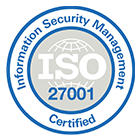
Resolve Tech Solutions Featured in ISG Provider Lens for SAP Managed Platform and Cloud Services for SAP ERP
Resolve Tech Solutions Featured in ISG Provider Lens for SAP Managed Platform and Cloud Services for SAP ERP
RTS has recently been recognized by ISG as a contender in Managed Platform and Cloud Services for SAP ERP systems.
With a long-standing relationship with SAP, RTS starts many engagements with this core business system, and as many of our subscribers know, there is a compelling industry event happening in the SAP space around S4/HANA migration.
On-premises software solutions were designed to meet a different era of business needs. Systems that lack flexibility, have limited integration capabilities, outdated user interfaces, require costly maintenance, are not optimized for mobile accessibility and are vulnerable to security threats. Aside from end of life for SAP ECC approaching, legacy systems will hinder an organization’s ability to scale and grow at the required speeds in the modern era.
– 53% of businesses believe that their ERP is a primary tech for investment and updates.
– 60% – 80% of IT budgets are spent on maintenance for ERP systems on legacy systems.
Now is the time to start migrating as many modernization initiatives take between 3 and 5 years and to receive the maximum benefit, in most cases, moving to cloud is also needed.
According to Gartner there are still over 10k SAP ECC customers that have not bought SAP S4/HANA.
Migrating to SAP S/4HANA can be a complex process due to several reasons and having the right people and processes executing on the migration is imperative for meeting deadlines and overall success.
Here are some factors that contribute to the complexity of the migration:
- Data Structure Changes: S/4HANA introduces significant changes to the underlying data structure compared to previous SAP systems like SAP ECC. It uses an in-memory database and eliminates traditional database indexes, leading to a simplified and faster data model. However, this requires data to be transformed and migrated to align with the new structure, which can be a complex and time-consuming task.
- Custom Code Adaptation: SAP S/4HANA is built on the SAP HANA platform, which utilizes a new programming language called ABAP on HANA. As a result, custom code, such as modifications, enhancements, and custom reports, needs to be adapted to work in the new environment. This requires code remediation and adjustment to leverage the performance optimizations and new functionalities provided by S/4HANA.
- Simplification and Functional Changes: S/4HANA is not just a technical upgrade but also a business transformation platform. SAP has made efforts to simplify and streamline business processes in S/4HANA, which may result in functional changes and impact existing business processes. Organizations need to analyze their current business processes, identify gaps, and redesign or reconfigure processes to align with S/4HANA’s best practices. This can require significant effort and coordination across different business functions.
- Third-Party System Integration: Many organizations have integrated their SAP systems with various third-party applications and systems. During the migration to S/4HANA, it becomes essential to ensure that these integrations are compatible and function properly in the new environment. The changes in data structures, APIs, and system behavior in S/4HANA may require modifications or updates to the integration points, which can be complex and require thorough testing.
- Data Volume and Cleansing: Migrating large volumes of data to S/4HANA can be challenging. As part of the migration, organizations often take the opportunity to clean up and optimize their data. This includes data archiving, data validation, and data cleansing activities to ensure the quality and integrity of the migrated data. These tasks require careful planning, data analysis, and coordination with different stakeholders.
- Project Complexity and Resources: Migrating to S/4HANA is a complex project that requires a multidisciplinary team, including technical experts, functional consultants, project managers, and business stakeholders. Coordinating the activities, managing dependencies, and ensuring proper testing and training can add to the complexity of the migration process.
With years of SAP Expertise RTS is a not only trusted partner in the execution of migrating ERP systems but an ISG contender in Managed Platform and Cloud Services for SAP ERP systems.




